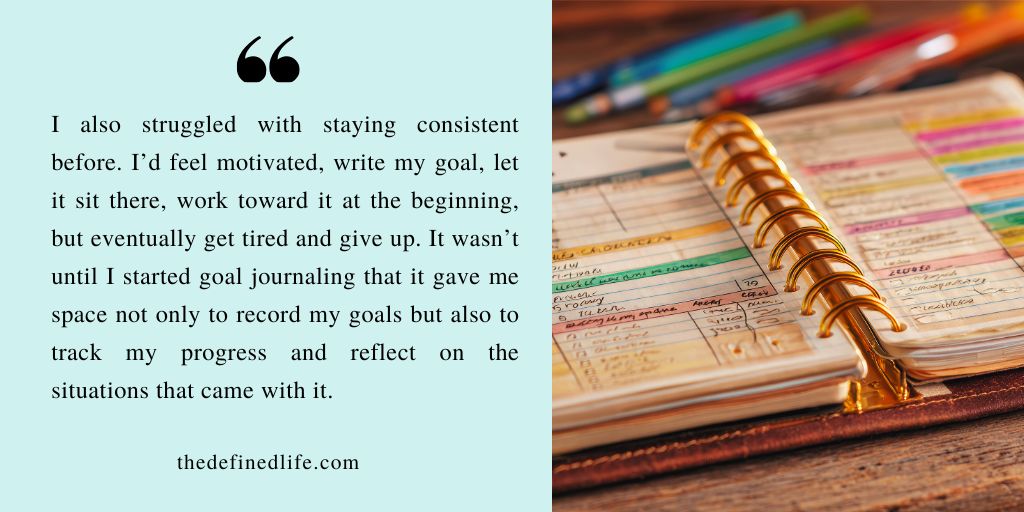
Most of us have written down goals in a simple to-do list—“work out more,” “save money,” “start a side hustle.” But lists often get forgotten, leaving us feeling stuck. Goal journaling goes deeper by giving you space to track progress, reflect on your motivation, and stay accountable. It turns your goals into a personal roadmap instead of just a checklist, helping you actually follow through and grow along the way.
I also struggled with staying consistent before. I’d feel motivated, write my goal, let it sit there, work toward it at the beginning, but eventually get tired and give up. It wasn’t until I started goal journaling that it gave me space not only to record my goals but also to track my progress and reflect on the situations that came with it.
In this post, I’ll walk you through how goal journaling works, why it’s effective, and simple ways you can start today (even if you’ve never journaled before).
Table of Contents
Why Goal Journaling Works
When you write your goals down, you’re doing more than making a to-do list. Goal journaling turns your intentions into something you can see, reflect on, and come back to. It’s a practice that keeps your goals alive rather than forgotten. Here’s why it works:
Clarify what you really want – Writing slows you down and forces you to get specific. Instead of “I want to be healthier,” you might write “I want to build stamina by jogging 20 minutes three times a week.” Clarity makes the path forward easier to see.
Stay accountable – A written goal is harder to ignore. Each time you open your journal, you’re reminded of the promises you made to yourself. That small nudge builds accountability without the guilt trip.

Track progress – Journaling lets you capture the small wins that usually get overlooked. Checking off a workout, logging money saved, or noting a new skill learned shows you that progress is happening, even when it feels slow.
Build self-awareness – The more you write, the more patterns you’ll notice. Maybe you’re most productive in the mornings or you lose momentum after stressful days. Seeing these patterns helps you adjust your approach instead of giving up.
Reduce overwhelm – Big goals can feel intimidating, but journaling naturally breaks them down into smaller, doable steps. Writing “finish a book” becomes “write 200 words today,” which feels much less heavy.
And the best part? Research shows that people who write down their goals are significantly more likely to achieve them. Journaling doesn’t just record your goals—it connects them to your emotions, your motivation, and your daily actions. That’s what makes them stick.

How to Start Goal Journaling
If you’ve never tried goal journaling before, don’t worry—it’s simpler than it sounds. Think of it as having a quiet space where you check in with yourself and your goals. You don’t need special supplies; a notebook, planner, or even the notes app on your phone works just fine. What matters most is showing up and writing regularly.
Here’s a beginner-friendly way to get started:
1. Write your goal clearly
Vague goals are easy to forget. Instead of writing “Be healthier,” try: “Exercise for 30 minutes, 3 times a week.” The clearer your goal is, the easier it is to track and work toward.
2. Break it down into small steps
Big goals can feel overwhelming if you only focus on the finish line. Use your journal to write the next small step you can take. For example: instead of just writing “Write a book,” your next step could be “Brainstorm chapter ideas this week.”
3. Track your progress
Make space in your journal to notice what’s working. You don’t need long entries—just quick check-ins like:
✅ Did I take one step today?
✅ How do I feel about it?
✅ What’s my next step?
This keeps you moving forward without pressure.
4. Reflect when things don’t go as planned
Journaling is a safe place to figure out why you’re stuck. If you skip a step or lose motivation, ask yourself:
- What got in the way?
- What can I change to make this easier?
- Is this goal still meaningful to me?
Sometimes reflection helps you get back on track. Other times, it shows you that a goal needs to shift—and that’s completely okay.
The real power of goal journaling is not perfection—it’s progress. Even small steps add up when you take time to notice them.
Goal Journaling Prompts to Keep You Motivated

If you’re staring at a blank page, try these prompts to get started:
What’s my biggest goal right now and why does it matter to me? -This connects your goal to a deeper reason. When you know why it matters, you’re more likely to stay committed.
What small step can I take today that will move me closer? – Big goals can feel overwhelming. This prompt helps you break them into doable actions so you can make steady progress.
What obstacles might come up this week, and how can I handle them? – Thinking ahead prepares you for challenges. Instead of being caught off guard, you’ll already have a plan.
How will I celebrate progress, even small wins? – Acknowledging your efforts keeps motivation high. Celebrations don’t have to be big; even small ones can keep you motivated.
Starting a joy journal is an amazing way to celebrate your progress and success.
If I feel stuck, what advice would I give myself as a friend? – This shifts your perspective. Instead of being hard on yourself, you practice kindness and find solutions with a supportive mindset.
Tips to Make Goal Journaling a Habit
Pair it with another routine
The easiest way to stick with journaling is to connect it to something you already do every day. For example, jot down your goals while sipping your morning coffee, or spend five quiet minutes before bed reflecting on your progress. Linking it to an existing habit makes journaling feel natural instead of “one more thing to do.”

Keep it simple
You don’t need to write a full essay every time you open your journal. Even two or three sentences can be powerful if they’re honest and intentional. Think of it as a check-in with yourself, not a homework assignment.
Review weekly
Set aside one day each week—like Sunday—to look back at your entries. Ask yourself: Did I follow through on my steps? What worked well? What needs adjusting? This review helps you see progress you might otherwise overlook and keeps your goals fresh in your mind.
✨ Looking for fresh journaling inspiration?
I’ve written a collection of posts all about journaling—whether you’re curious about goal setting, mindfulness, or creative prompts, there’s something waiting for you. Come explore the journaling section of my blog and find your next favorite idea to write about. 💌 Journaling Topics
Celebrate yourself
Every step counts, no matter how small. Use checkmarks, doodles, or even a big bold “YES!” in your journal to celebrate progress. You could also reward yourself outside the page—like treating yourself to your favorite snack or taking a break. Celebrating keeps motivation alive and makes the journey more enjoyable.

Final Thoughts on Goal Journaling
Goal journaling gives your dreams a space outside your head. Once they’re written down, they feel clearer, easier to track, and less overwhelming. Over time, the little steps you record add up, and you’ll start to see how much progress you’ve really made.
You can learn also from your hidden self, Check out Shadow Work Journaling to learn more.
You don’t need a lot of time to do this. Even a few minutes a day can bring focus and consistency. Start with one goal, write it down, and commit to a small step forward. That’s how momentum builds.
Love and light,








Leave a Reply